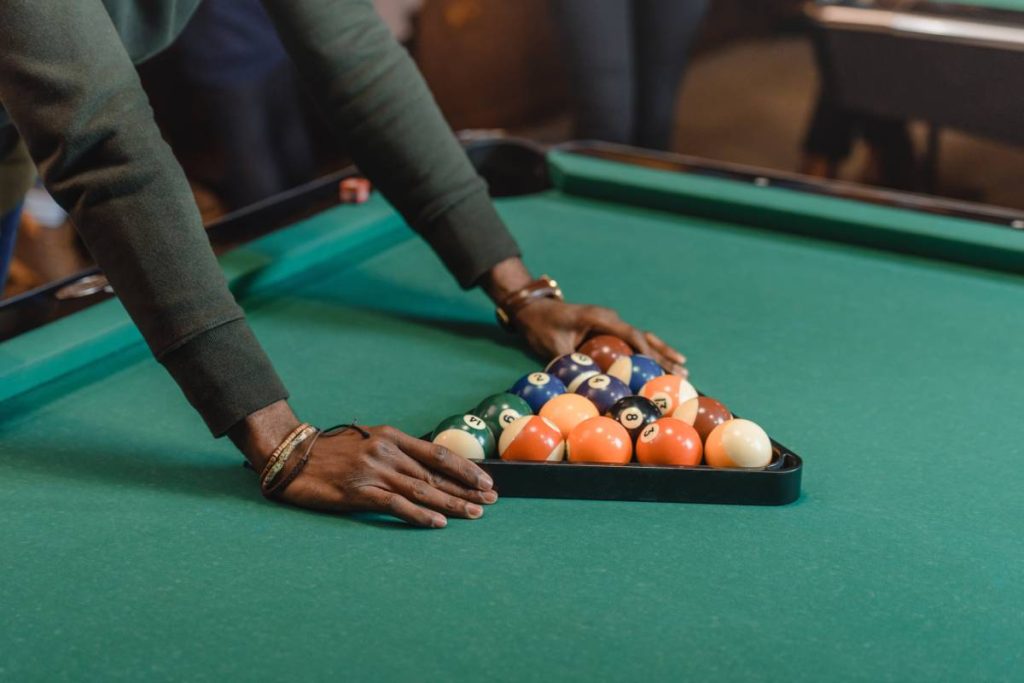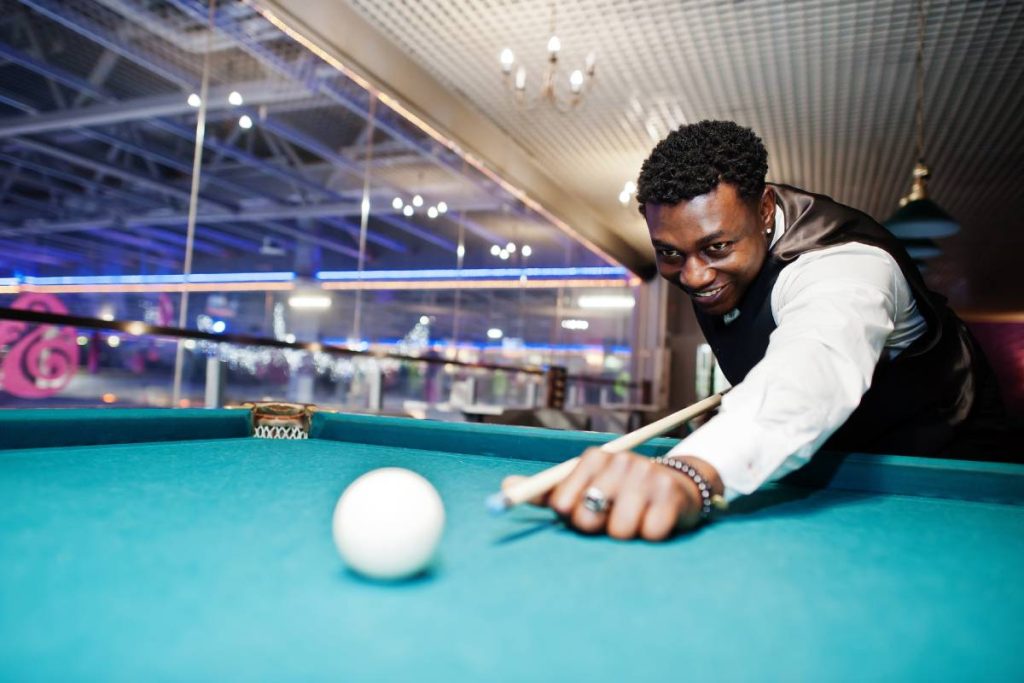Pool, a game synonymous with leisure and competition, has carved its place as a beloved pastime worldwide. From the casual clinking of cues in local pubs to the intense matches on professional stages, this cue sport, also known as billiards, draws players and spectators alike into its magnetic orbit.
In exploring its popularity, the journey takes us through the accessible allure, the social fabric it weaves, and the diverse tapestry of games that fall under the umbrella term “pool.”
Let’s cue up the exploration of why this game, with its simple ingredients of a table, balls, and a cue stick, has become a global favourite.
Why is billiards also known as “pool”?
Billiards is commonly known as “pool” due to the historical evolution and linguistic changes that took place over the years. The term “pool” doesn’t refer to a swimming pool, but rather has its roots in the game’s origins and the way people used to bet on the outcome of matches.
The word “pool” originally referred to a collective bet or wager. In the 19th century, billiards was a popular game in which players would place bets on the outcome of the game. The money wagered would be pooled together, forming a collective pot that the winner would take. This led to the term “poolroom” being used to describe establishments where people gathered to place bets on billiards matches.
As time passed, the association between billiards and betting became so strong that people started using the term “pool” to refer to the game itself. Instead of saying they were going to play billiards, people would say they were going to play pool. This shift in language became widespread, and eventually, the term “pool” became synonymous with the game of billiards.

The transition from “billiards” to “pool” was further fueled by the increasing popularity of the game in the United States. During the 20th century, billiards evolved into various forms, with different rule sets and game variations. The most common of these variations became known as eight-ball pool, nine-ball pool, and others. These variations contributed to the diversification of the game and its continued association with the term “pool.”
In modern usage, the terms “billiards” and “pool” are often used interchangeably, though purists may argue distinctions between specific games like carom billiards, snooker, and pool. However, for the majority of people, “pool” has become the umbrella term for various cue sports played on a rectangular table with pockets.
It’s interesting to note that the term “pool” in this context doesn’t have a direct connection to water. Instead, it reflects the communal betting aspect that was prevalent in the early days of the game. So, the next time you hear someone mention playing pool, you can trace the origin of the term back to the collective betting practices that were an integral part of the game’s history. The evolution of language and the cultural nuances surrounding billiards have given us the familiar term “pool” that we use today to describe this enjoyable and competitive cue sport.
How do you play pool?
Playing pool is a fun and social activity that involves using a cue stick to strike billiard balls on a rectangular table with pockets. Whether you’re a beginner or just looking for a refresher, here’s a simple guide on how to play pool.
Setting Up:
- Gather Equipment: You’ll need a pool table, a set of billiard balls (usually 16 in total, numbered 1-15 plus a cue ball), and a cue stick.
- Rack ‘Em Up: Arrange the numbered balls in a triangular rack, with the 1-ball at the front and the 8-ball in the center. Place the remaining balls randomly within the triangle. The cue ball goes behind the rack.
The Break:
- Decide Who Goes First: Usually, players flip a coin or lag (each shooting the cue ball towards the opposite rail, and the one whose ball comes closest to the head rail without touching it gets to break).
- Break Shot: The player breaking hits the cue ball aiming to scatter the racked balls. If any balls are pocketed during the break, the breaking player continues shooting.

Gameplay:
- Choosing Solids or Stripes: After the break, players are assigned either the solid or striped balls based on the first one they pocket. The 8-ball is the last to be pocketed.
- Taking Shots: Players take turns to shoot at their designated group of balls, aiming to pocket them in numerical order. If a ball is potted, that player gets to shoot again.
- Cue Ball Fouls: If the cue ball is pocketed or doesn’t hit any balls, it’s a foul. The other player gets ball-in-hand, meaning they can place the cue ball anywhere on the table.
The 8-Ball:
- Timing is Everything: Players continue shooting until they pocket all their designated balls. The 8-ball is the last one to be pocketed.
- Call Your Shots: When shooting at the 8-ball, players must call the pocket they intend to sink it in. If they successfully pocket it in the called pocket, they win. If not, the opponent gets a chance.
Winning:
- Legal Victory: The game is won when a player legally pockets the 8-ball after pocketing all their designated balls.
- Foul Play: If a player fouls while shooting at the 8-ball, the opponent can place the 8-ball anywhere on the table and take their shot.
- Scratching on the 8-Ball: If a player scratches (pockets the cue ball) while shooting at the 8-ball, the opponent gets ball-in-hand and can place the cue ball anywhere.
Etiquette:
- Respect Others: Be mindful of other players while they’re shooting.
- Cue Stick Handling: Hold the cue stick properly and avoid banging it on the table.
- Know the Rules: Familiarize yourself with the specific rules of the game you’re playing (e.g., 8-ball, 9-ball) to avoid disputes.
Playing pool is all about having a good time, so don’t be afraid to ask questions and enjoy the game!
Is pool a popular sport? Where is billiards most popular?
Pool, also known as billiards, is undeniably a popular sport enjoyed by millions of people worldwide. Its widespread appeal can be attributed to several factors, including its accessibility, social nature, and the diversity of the game itself.
Accessibility
One of the reasons for pool’s popularity is its accessibility. Pool tables can be found in a variety of settings, from local pubs and community centers to dedicated billiards halls. The relatively simple equipment – a cue stick, balls, and a table – makes it easy for people to engage in the game without requiring extensive training or specialized gear. This accessibility contributes to the game’s popularity among people of all ages and skill levels.
Social Nature
Pool is inherently a social game. It often serves as a gathering point for friends, family, and even strangers looking to share a good time. Whether played casually in a relaxed setting or competitively in organized leagues, pool fosters a sense of camaraderie and friendly competition. The interactive and conversational nature of the game makes it a popular choice for socializing while enjoying a game.
Variety of Games
Another aspect that adds to the popularity of pool is the variety of games within the broader category of billiards. While “pool” is often used as a general term, it encompasses different games like eight-ball, nine-ball, straight pool, and more. Each variation has its own set of rules and strategies, providing players with diverse options to suit their preferences. This diversity ensures that there is a pool game for everyone, from beginners to seasoned players.

Global Popularity
Billiards has a global presence, and its popularity extends to various parts of the world. Different forms of cue sports have gained widespread recognition, with each region often favoring specific variations. The game’s universal appeal transcends cultural boundaries, making it a shared passion among people from diverse backgrounds.
Regional Hotspots
While pool is enjoyed globally, certain regions have become notable hotspots for billiards. The United States, for example, has a significant pool culture, with numerous billiards halls and a strong presence in both casual and competitive settings. In Asia, particularly in countries like China and Taiwan, there is a thriving pool community with a focus on competitive play.
Europe also boasts a rich tradition of cue sports, with snooker—a variant of billiards—being particularly popular in countries like the United Kingdom. In these regions, the presence of professional tournaments and skilled players further contributes to the sport’s popularity.
Conclusion
As we rack up the cues and pocket the final ball, the global journey through the popularity of pool reveals a game that has woven itself into the fabric of diverse cultures. From the bustling pool halls of the United States to the strategic plays in the snooker arenas of Europe and the thriving communities in Asia, billiards stands as a universal language of leisure and competition.
Its accessibility, social appeal, and the rich tapestry of games within its realm ensure that whether played in a casual corner pub or under the spotlight of professional tournaments, pool remains a game that resonates with people across the globe. In the clatter of balls and the crisp strikes of the cue, we find the enduring popularity of a sport that continues to captivate and connect.
So, whether you’re a seasoned player or a casual enthusiast, the allure of pool is an invitation to step up to the table and be part of a timeless game that unites us all.

